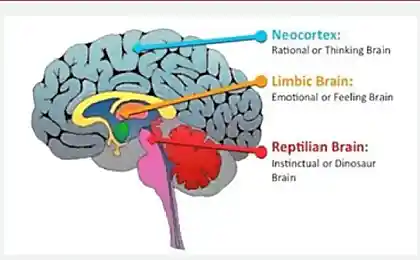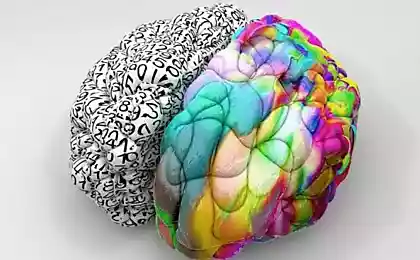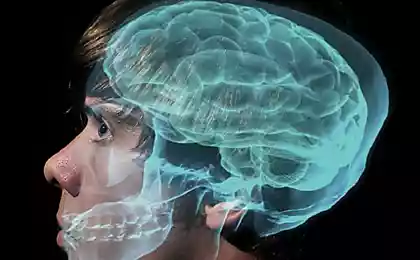1626
How can you trick your brain
Scientists have found a number of ways that can trick our brains, let's learn about them.

1. Procedure Gantsfelda
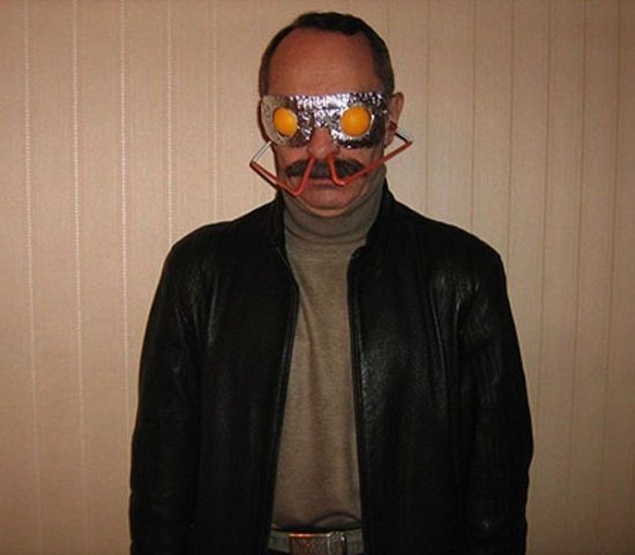
Procedure Gantsfelda a soft touch isolation technique, which was first proposed in experimental psychology in 1930. For this experiment, you need to configure the radio interference, to lie on the couch and using adhesive tape to attach the eyes of half of table tennis balls. Within a minute a person begins to experience hallucinations. Some people see the horses running in the clouds, while others hear the voice of a deceased relative.
The thing is that our mind is dependent on sensations and when they become very small, our brains begin to invent their own.
2. Reduction of pain

If you ever hurt yourself a little, take a look at the damaged part with an inverted binoculars - pain should decrease.
Scientists from the University of Oxford in the experiment have shown that if you look at the injured arm through the distal end of the binoculars, it visually reduces the size of the hand, as well as the pain and swelling. This suggests that even the basic sensations, such as pain, are dependent on our vision.
3. Pinocchio illusion

For this experiment you need two chairs and a blindfold. A man with a bandage sits in the back seat, giving a look at the front of a seated person. Then the one who blindfolded, holds out his hand and places it on the nose of the one who sits in front.
At the same time with the other hand he touches his nose and begins to gently caress the two nose. After a minute or more than 50% of people say that their nose is lengthened.
4. Cheating thinking
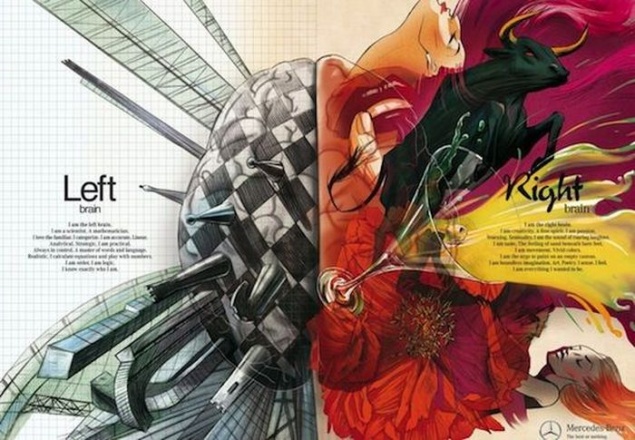
Lift the right leg a few centimeters from the floor and begin to move it in a clockwise direction. As long as you do it, you use the index finger of the right hand to draw the number 6 in the air begins to rotate your foot clockwise and nothing you can do about it.
The left half of the brain that controls the right side of the body responsible for the rhythm and timing. She can not cope with the work of two opposite movements in the same time and combines them into a single movement.
5. Cheating hearing
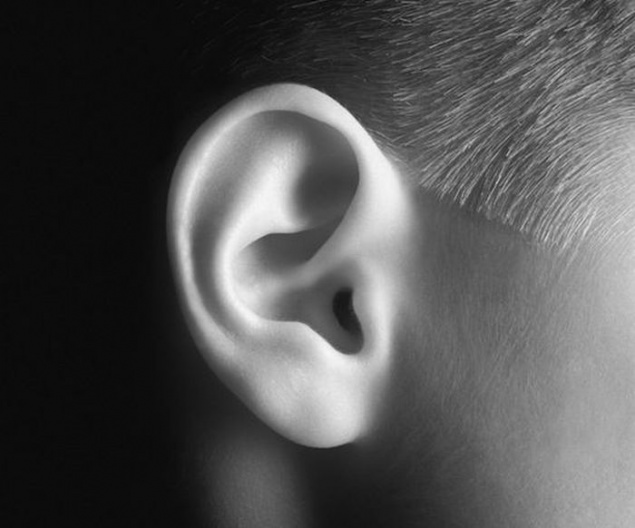
This trick can be done with three people, one of whom will be a guinea, and the other two - observers. Also, you will need headphones attached to two plastic tubes on both sides. Ask the subject to sit on a chair at an equal distance between the two observers. Each observer in turn, says into the phone with the relevant parties. The student in this case, correctly determines the direction of the sound. If the change tubes and begin to speak, the listener gets confused and will indicate the opposite direction of the sound.
Auditory Localization - a person's ability to determine the direction of the sound source. The human auditory system is endowed with disabilities to determine the distance of the sound source, and is based on mezhzvukovoy time difference. When you change the tube, the perception of activated neurons on the opposite side of the brain, and the person can not determine the source of the sound.
6. The rubber hand illusion
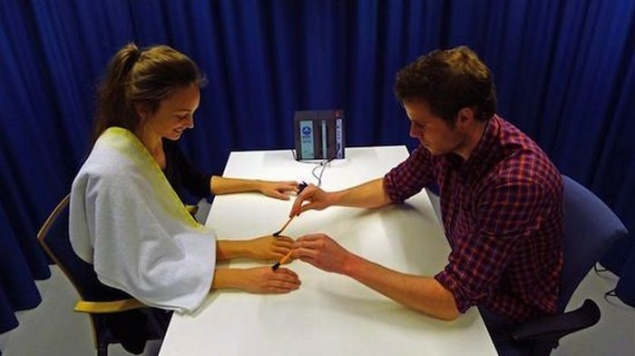
More than ten years ago, psychologists have found an illusion that allows you to convince a person that the rubber hand is his own. For this experience need a rubber arm or inflated rubber glove, a piece of cardboard and two brushes. Place the rubber hand on the table in front of him, and his hand hide behind cardboard. Ask someone at the same time stroking the real hand and the rubber, using the same motion brushes.
After a few minutes you will have the feeling that an artificial hand was your flesh. If you ask the other person to hit a rubber hand, he feels the anxiety and pain, because the brain is convinced that the rubber hand is real.
7. The sound that can be heard by anyone under 20 years
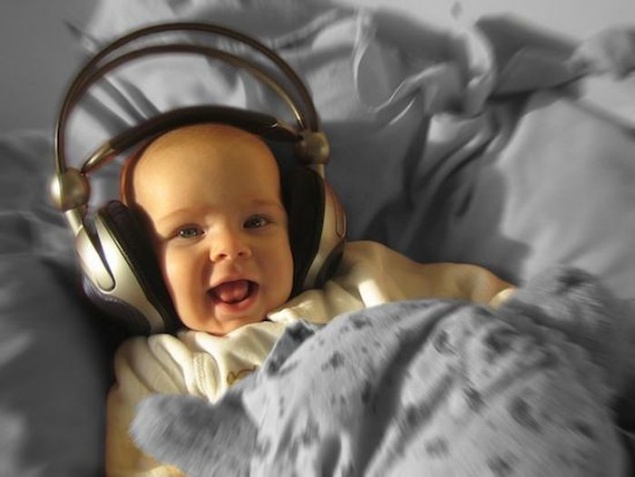
The sound, the sine wave frequency of 18,000 Hz, audible to those who yet 20 years old. It is used by some teenagers as a ringtone on your mobile phone, so that other people could not hear any ringing phone. You can listen here.
As soon as a man gets older, he loses the ability to hear sounds higher tones, and therefore only young people under the age of 20 are able to catch him.
8. The effect of Purkinje
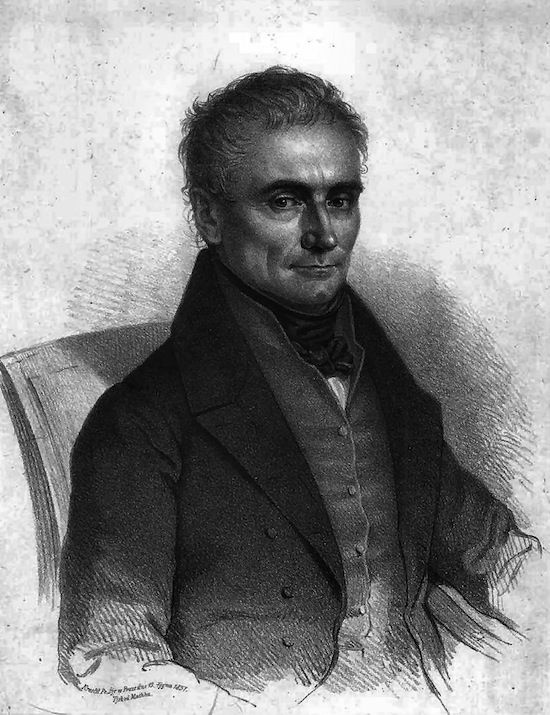
Jan Purkinje
Jan Purkinje, the founder of modern neuroscience, while still a child, discovered an interesting hallucination. He closed his eyes, turned his head towards the sun, and quickly began to drive his hand back and forth in front of the closed glazami.Cherez few minutes Purkinje noticed colorful shapes that became more zamyslovatymi.Vposledstvii scientists have created special glasses, which lights up the light at a certain frequency. Such stimulation creates a short circuit in the visual cortex of the brain, and the cells begin to "light up" in an unpredictable way, which leads to fictitious images.
Source: www.factroom.ru

1. Procedure Gantsfelda

Procedure Gantsfelda a soft touch isolation technique, which was first proposed in experimental psychology in 1930. For this experiment, you need to configure the radio interference, to lie on the couch and using adhesive tape to attach the eyes of half of table tennis balls. Within a minute a person begins to experience hallucinations. Some people see the horses running in the clouds, while others hear the voice of a deceased relative.
The thing is that our mind is dependent on sensations and when they become very small, our brains begin to invent their own.
2. Reduction of pain

If you ever hurt yourself a little, take a look at the damaged part with an inverted binoculars - pain should decrease.
Scientists from the University of Oxford in the experiment have shown that if you look at the injured arm through the distal end of the binoculars, it visually reduces the size of the hand, as well as the pain and swelling. This suggests that even the basic sensations, such as pain, are dependent on our vision.
3. Pinocchio illusion

For this experiment you need two chairs and a blindfold. A man with a bandage sits in the back seat, giving a look at the front of a seated person. Then the one who blindfolded, holds out his hand and places it on the nose of the one who sits in front.
At the same time with the other hand he touches his nose and begins to gently caress the two nose. After a minute or more than 50% of people say that their nose is lengthened.
4. Cheating thinking

Lift the right leg a few centimeters from the floor and begin to move it in a clockwise direction. As long as you do it, you use the index finger of the right hand to draw the number 6 in the air begins to rotate your foot clockwise and nothing you can do about it.
The left half of the brain that controls the right side of the body responsible for the rhythm and timing. She can not cope with the work of two opposite movements in the same time and combines them into a single movement.
5. Cheating hearing

This trick can be done with three people, one of whom will be a guinea, and the other two - observers. Also, you will need headphones attached to two plastic tubes on both sides. Ask the subject to sit on a chair at an equal distance between the two observers. Each observer in turn, says into the phone with the relevant parties. The student in this case, correctly determines the direction of the sound. If the change tubes and begin to speak, the listener gets confused and will indicate the opposite direction of the sound.
Auditory Localization - a person's ability to determine the direction of the sound source. The human auditory system is endowed with disabilities to determine the distance of the sound source, and is based on mezhzvukovoy time difference. When you change the tube, the perception of activated neurons on the opposite side of the brain, and the person can not determine the source of the sound.
6. The rubber hand illusion

More than ten years ago, psychologists have found an illusion that allows you to convince a person that the rubber hand is his own. For this experience need a rubber arm or inflated rubber glove, a piece of cardboard and two brushes. Place the rubber hand on the table in front of him, and his hand hide behind cardboard. Ask someone at the same time stroking the real hand and the rubber, using the same motion brushes.
After a few minutes you will have the feeling that an artificial hand was your flesh. If you ask the other person to hit a rubber hand, he feels the anxiety and pain, because the brain is convinced that the rubber hand is real.
7. The sound that can be heard by anyone under 20 years

The sound, the sine wave frequency of 18,000 Hz, audible to those who yet 20 years old. It is used by some teenagers as a ringtone on your mobile phone, so that other people could not hear any ringing phone. You can listen here.
As soon as a man gets older, he loses the ability to hear sounds higher tones, and therefore only young people under the age of 20 are able to catch him.
8. The effect of Purkinje

Jan Purkinje
Jan Purkinje, the founder of modern neuroscience, while still a child, discovered an interesting hallucination. He closed his eyes, turned his head towards the sun, and quickly began to drive his hand back and forth in front of the closed glazami.Cherez few minutes Purkinje noticed colorful shapes that became more zamyslovatymi.Vposledstvii scientists have created special glasses, which lights up the light at a certain frequency. Such stimulation creates a short circuit in the visual cortex of the brain, and the cells begin to "light up" in an unpredictable way, which leads to fictitious images.
Source: www.factroom.ru





